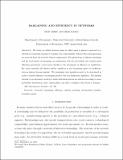Bargaining and efficiency in networks
Author(s)
Abreu, Dilip; Manea, Mihai
DownloadManea_Bargaining and.pdf (306.7Kb)
PUBLISHER_CC
Publisher with Creative Commons License
Creative Commons Attribution
Terms of use
Metadata
Show full item recordAbstract
We study an infinite horizon game in which pairs of players connected in a network are randomly matched to bargain over a unit surplus. Players who reach agreement are removed from the network without replacement. The global logic of efficient matchings and the local nature of bargaining, in combination with the irreversible exit of player pairs following agreements, create severe hurdles to the attainment of efficiency in equilibrium. For many networks all Markov perfect equilibria of the bargaining game are inefficient, even as players become patient. We investigate how incentives need to be structured in order to achieve efficiency via subgame perfect, but non-Markovian, equilibria. The analysis extends to an alternative model in which individual players are selected according to some probability distribution, and a chosen player can select a neighbor with whom to bargain.
Date issued
2011-11Department
Massachusetts Institute of Technology. Department of EconomicsJournal
Journal of Economic Theory
Publisher
Elsevier
Citation
Abreu, Dilip, and Mihai Manea. “Bargaining and Efficiency in Networks.” Journal of Economic Theory 147, no. 1 (January 2012): 43–70.
Version: Author's final manuscript
ISSN
00220531
1095-7235